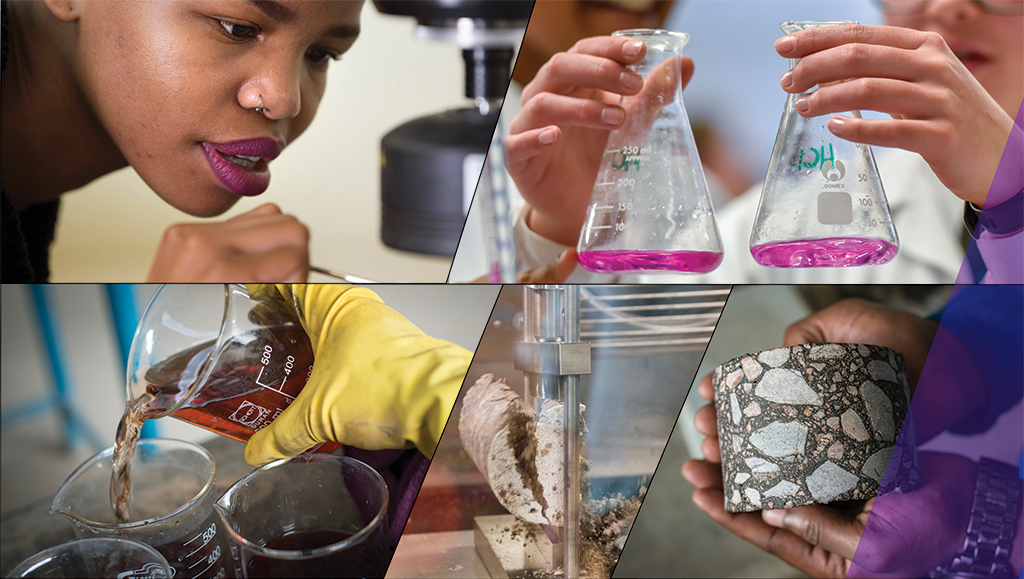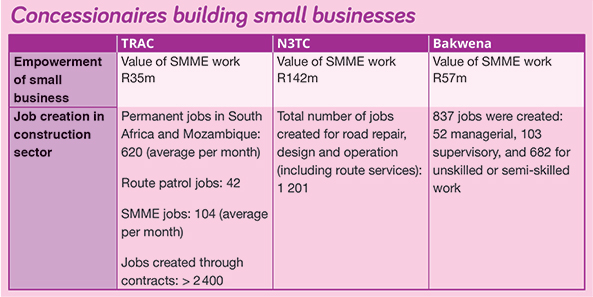
Research designs our future
H igh-level partnerships between SANRAL, universities and research bodies contribute to work that will determine the quality of the country’s road and transport infrastructure in the future.
Together they contribute to the growth of a dynamic engineering sector with world-class expertise in road design, construction and transport management.
At Stellenbosch University the SANRAL Chair in Pavement Engineering has dual teaching and research functions. It also contributes to the
empowerment of black professionals and draws a significant proportion of post graduate students from other African countries.
At the University of Cape Town, the SANRAL Chair in Transport Planning has a dedicated focus on research issues relating to the impact of transport planning on social equity and poverty alleviation.
At the University of the Free State the SANRAL Chair in Mathematics, Natural Science and Technology Education directs its resources to post -graduate research and the training of teachers in these subjects that are vital to skills development in the country.
It has also joined forces with academics and educators to develop a Science-for-the-Future programme, which gives high school learners opportunities to get hands-on experience in science laboratories. Another initiative helps to excite interest in maths and science among younger children and assist teachers in the design of learning materials. Similar programmes are also in place at the Nelson Mandela University.
Together with the University of Pretoria and the Council for Scientific and Industrial Research (CSIR), SANRAL is planning facilities to develop and test materials that can be used in road construction and transport infrastructure.
Valuable investments in local jobs and training
A strong focus on local job creation on SANRAL projects contributes significantly to job creation and skills development.
Community development projects involve local roads in communities situated close to the national road network, where the lives of residents may be affected by their proximity to major roads.
In most instances, these projects involve the construction of cement pedestrian walkways, the surfacing of gravel roads and the improvement of culverts. Members of local communities are often also responsible for the installation of kerbs and lighting, the erection of pedestrian bridges and improvements to intersections.
In all cases, the construction projects are suited to labour-intensive building methods, which can be undertaken by inexperienced workers with the correct guidance and training.
Projects are undertaken in close liaison with community representatives to ensure local input and support. Preference is given to the employment of local residents, especially women and young people, who are the most severely affected by joblessness.
Dedicated skills-transfer programmes and on-thejob training ensure that the participants are able to find future employment
Wherever possible, SANRAL ensures that the course offered to local workers is accredited by the South African Qualifications Authority (SAQA).
Small business and local enterprises also benefit from training offered in fields relating to management and supervision of projects.
SANRAL’s preference for local materials and skills has a ripple effect on the participating communities and injects additional cash into local economies.
In 2017/18, 29 community development projects were under way in various provinces.
In 2017/18, 29 community development projects were under way in various provinces. The combined expenditure on these projects was R367m, a 42% increase on the previous year’s figure. Some 163 emerging enterprises benefited from these projects and 91% of these SMMEs were black-owned.
Through its commitment to community development projects, SANRAL makes vital contributions to job creation and the transfer of skills and injects critical investments in the provision of safer and more peoplefriendly road environments.

BUILDING SOUTH AFRICA THROUGH BETTER ROADS
People's Guide 2018